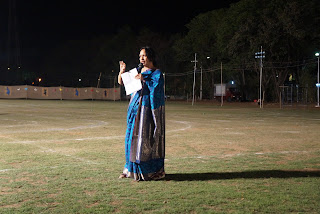।। रेखासप्तकम् ।।
कलाप्रीतिरस्या हि नृत्येऽपि गीते
यया गुर्जरीमातृभाषा सुलेभे
।
तथाप्युर्दुहिन्द्याङ्ग्लभाषाप्रभुत्वं
नमो भाग्यरेखे
नमः कोटिवारम् ।।1।।
सदा कार्यकौशल्यराज्ञी प्रसिद्धा
मुदा लब्धनीतिः सुवाचि प्रभुत्वम् ।
सदा राजते
शारदा तन्मुखे हि
नमो भाग्यरेखे
नमः कोटिवारम् ।।2।।
सदा नम्रवाणी
सदा पथ्यभाषा
सुधाया निवासः सदा मोदजिह्वा ।
ऋतं नित्यसूक्तं प्रियं
वाऽप्रियं वा
नमो भाग्यरेखे
नमः कोटिवारम् ।।3।।
गुणग्राहिणी या गुणश्राविणी या
सदा योजिका
या सदाऽऽयोजिका या ।
अयोग्यो न
कोऽपीति तन्मूलमन्त्रं
नमो भाग्यरेखे
नमः कोटिवारम् ।।4।।
सुहास्या सुनेत्री विनम्रा
सुशीला
सुलेखा सदा
ध्येयपन्थानुगम्या ।
जनानां हृदि प्राप्तमाना सदैव
नमो भाग्यरेखे
नमः कोटिवारम् ।।5।।
ध्येयाकाशी प्रसन्ना बहुगुणनिलया सात्त्विकाहारभोजी
शुद्धाचार्या च काये मनसि वचसि या साधुकर्मानुगम्या ।
नित्यं न्याय्यानुमार्गी नमितखलजना सर्ववादान् जयन्ती
आदर्शा प्राप्तविद्या गणपतिविनता मातृरूपे नमस्ते।।6।।
नेतृत्वगुणसंपन्ना कलावाङ्मयसाधिका ।
प्राचार्या मातृरूपेण विद्यालये विराजते ।। 7।।
।। इति श्रीहरिविरचितं रेखासप्तकं सम्पूर्णम् ।।








This stotra is dedicated to our beloved Principal of Udayachal High School Mrs. Rekha Pandey who is truely a mentor, guide and philosopher of everyone of us. Love you teacher. We truely pay our homage from the bottom of our heart.
ReplyDelete"रेखासप्तकम्" - 6th श्लोक -
ReplyDelete(१) "आहारभॊजी" and "अनुमार्गी" seem to be masculine forms. And feminine forms of these adjectives won't fit in this वृत्त, keeping other things same. So should you use "आहारभोक्त्री" and "अनुगन्त्री" instead" ?
(२) How the word "ध्येयाकाशी" is formed? This also seems to be a masculine form.
(३) "खलजननमिता" or "नमितखलजना" or "नमितखलजनी" or "नमितखलजनि:" ?
I doubt आहारभोजी, अनुमार्गी and ध्येयाकाशी are masculine forms of the corresponding "इन्नन्त" words.
ReplyDeleteDear Umesh, I apologize for late reply. Your doubt is correct. But, let me explain. There are two feminine suffixes ङीप् and ङीष् where ई remains.
ReplyDeleteAs per the sutra, "ऋन्नेभ्यो ङीप्" words ending न् and ऋ , take ङीप् suffix to form feminine words. For instance, सुनेतृ + ङीप् = सुनेतृ + ई = सुनेत्री
मानिन् + ङीप् = मानिन् + ई = मानिनी
But, as per the sutra "टिड्-ढाणञ्-द्वयसज्-दघ्नञ्-मात्रच्-तयप्-ठक्-ठञ्-कञ्-क्वरपः"
words ending in अण् take suffix ङीप् to form feminine words.
भोज, मार्ग and आकाश are derived by adding the suffix अण्. So आहारभोजी अनुमार्गी and ध्येयाकाशी are feminine words. अनुगन्त्री and आहारभोक्त्री are remarkable suggestions but harsh to pronounce.
नमितखलजना is better and proper than खलजननमिता. I will do the correction.
Thanks dear. Keep visiting.
Ok. But then does it mean that आहारभोजी, अनुमार्गी and ध्येयाकाशी are both - प्रथमा एकवचन of the corresponding "ई"कारान्त feminine words and also प्रथमा एकवचन of the corresponding "इन्नन्त" masculine words?
ReplyDeleteYes dear.
ReplyDelete